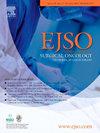结直肠癌择期手术后增强的恢复和生存——2865名预期患者的倾向评分加权分析
IF 2.9
2区 医学
Q2 ONCOLOGY
引用次数: 0
摘要
背景:增强恢复通路(enhanced recovery pathway, ERP)对结直肠癌手术(CCS)后存活的影响仍存在争议。材料和方法共2865名成人在CCS后参加了一项多中心队列研究(iCral3研究)。记录ERP的依从性百分比,并根据患者的四分位数进行分组。在机器学习广义增强模型(GBM)中考虑其他与患者、中心、疾病和治疗相关的因素,以估计参考治疗(第1四分位数,ERP依从率<; 57.7%)和其他治疗组(第2、3和4四分位数)之间二元比较的22个共变量倾向评分权重。主要终点是总生存期(OS)。使用基于相同协变量的gbm加权Cox模型来估计风险比(HR)和95%置信区间(95% CI)。结果第4四分位数患者(ERP依从率≥80.8%)的任何原因死亡风险显著降低(HR为0.69;95% CI为0.49-0.96;p = 0.026)。结论:高依从性ERP对长期总体生存有显著影响,支持CCS后适当实施ERP的努力。本文章由计算机程序翻译,如有差异,请以英文原文为准。
Enhanced recovery and survival after elective surgery for colorectal cancer - propensity score weighting analysis of 2,865 prospective patients
Background
The impact of enhanced recovery pathway (ERP) on survival after colorectal cancer surgery (CCS) remains controversial.
Materials and methods
A total of 2865 adults enrolled in a multicenter cohort study (iCral3 study) after CCS were followed up. The percentage adherence to the ERP was recorded, and the patients were grouped according to their quartiles. Other patient-, center-, disease-, and treatment-related factors were considered in a machine learning generalized boosted model (GBM) to estimate the 22 covariates propensity score weights for the binary comparisons between the reference treatment (1st quartile, ERP adherence rates <57.7 %) and the other treatment arms (2nd, 3rd, and 4th quartile). The primary endpoint was overall survival (OS). A GBM-weighted Cox model balanced on the same covariates was used to estimate the hazard ratio (HR) and 95 % confidence interval (95 %CI).
Results
Patients in the 4th quartile (ERP adherence rates ≥80.8 %) showed a significant lower risk of death from any cause (HR, 0.69; 95 %CI 0.49–0.96; p = 0.026).
Conclusions
High adherence to ERP was associated to a significant impact on long-term overall survival, supporting the efforts towards proper ERP implementation after CCS.
求助全文
通过发布文献求助,成功后即可免费获取论文全文。
去求助
来源期刊

Ejso
医学-外科
CiteScore
6.40
自引率
2.60%
发文量
1148
审稿时长
41 days
期刊介绍:
JSO - European Journal of Surgical Oncology ("the Journal of Cancer Surgery") is the Official Journal of the European Society of Surgical Oncology and BASO ~ the Association for Cancer Surgery.
The EJSO aims to advance surgical oncology research and practice through the publication of original research articles, review articles, editorials, debates and correspondence.
 求助内容:
求助内容: 应助结果提醒方式:
应助结果提醒方式:


